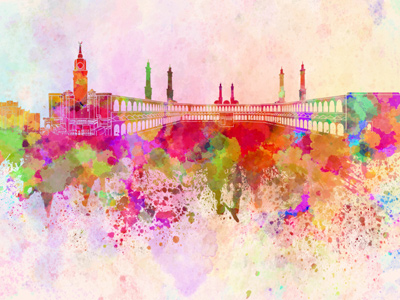
Mecca skyline in watercolour.
Pillars of Islam
The Five Pillars of Islam are the framework of a Muslim’s life. They are the belief or testimony of faith, prayer, giving zakat (support of the needy), fasting during the month of Ramadan, and the pilgrimage to Makkah once in a lifetime for those who are able.
The testimony of faith is saying with conviction, “La Ilaha Illallah, Muhammadur Rasool Allah.” This saying means “There is no true God but Allah, and Muhammad (PBUH) is the Messenger (Prophet) of Allah.” The first part, “There is no true God but Allah,” means that none has the right to be worshipped but Allah alone, and that Allah has neither partner nor son.
Our possessions are purified by setting aside a small portion for those in need, and, like the pruning of plants, this cutting back balances and encourages new growth. A person may also give as much as he or she pleases as voluntary alms or charity
Ready for more?
not all...
quizzers. Try to win a coveted spot on our Hall of Fame Page.







